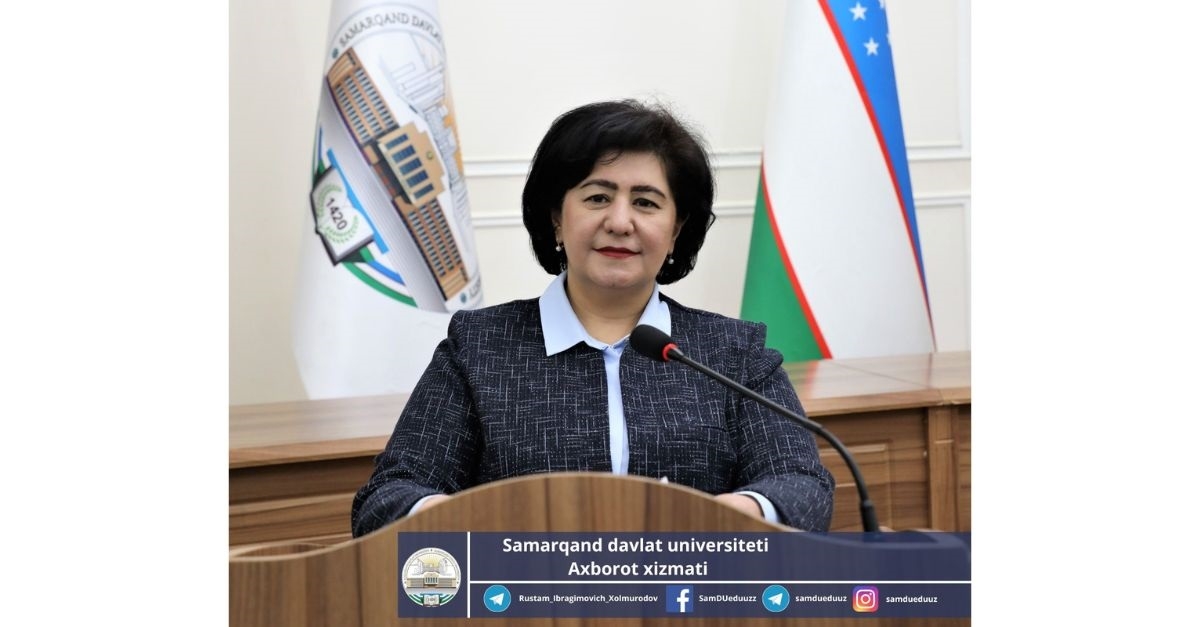Master's degree: Privileges, Opportunities, Responsibilities...


What news in the process of admission?!
Nigora Nizamova, Head of the Master's Center of Samarkand State University, answered questions related to news about admission to the Master's program, opportunities created, admission procedure, allocated quotas...
- What are the news on admission this year to Samarkand State University according to the master's admission plan for the 2023-2024 academic year?
- In accordance with the admission plan for the current year, 524 quotas have been allocated to the master's program of Samarkand State University for the 2023-2024 academic year, of which 428 are planned to be accepted on the basis of a state grant, and 96 on a paid contract basis. Education is conducted in three languages: Uzbek, Tajik and Russian. Among the announced master's degrees there are also several new directions. For example: physics: photonics, astronomy, hydrology, biotechnology (in horticulture), etc. Also, unlike last year, this year there is no admission to the areas of philosophy and digital economy.
- In terms of admission for the current year, all quotas in the specialties of the exact and natural sciences are allocated for the state grant. What is causing this?
- First of all, exact and natural sciences as fundamental sciences are directly related to the development of society, and their development has a special impact on the development of the country's economy. It should be noted that in recent years the President has paid serious attention to the development of exact and natural sciences. In particular, measures were developed to improve the quality of education in general and higher education, and research on practical application was designated as a priority. Fundamental sciences, firstly, serve as a source of necessary and important knowledge about the environment and the world, and secondly, enrich human capabilities and create the basis for humanity to take bold steps along the path of technical development. Therefore, in order to provide ample opportunities for young people who wish to engage in scientific research in these areas, quotas are allocated on the basis of a full state grant.
- If an applicant does not reach the admission limit for these specialties, can he study additionally by paying for the contract?
- Based on the results of enrollment, it can be accepted with the appropriate permission of the Cabinet of Ministers, based on the number of applicants and the internal potential of the university.
- Can you give information about the privileges of entering a master's program without a language certificate?
- In accordance with the Decree of the President of the Republic of Uzbekistan No. PQ-407 dated October 20, 2022, it is not required to present a national or equivalent international certificate of knowledge of a foreign language by persons with visual, hearing and speech impairments for admission to master's specialties of state higher educational institutions.
Also, holders of state scholarships named after the President, laureates of the State Prizes named after Zulfiya, laureates of the state award "Mard Uglon", winners of scientific Olympiads are admitted to the magistracy on preferential terms outside the general quota.
At the same time, admission without a language certificate is possible for graduates of the specialties "Chemistry", "Biology", "Computer Science" and "Information Technology", who received a diploma with honors. Only this privilege passes to the higher educational institution in which the graduate himself studied. These areas are preferential, with the exception of the quota, while students of other areas who graduated with honors apply with a foreign language certificate.
- Is it possible to enter a master's program with a B1 language certificate?
- According to the norms approved by the Ministry of Higher Education, Science and Innovation, a B2 level certificate is required for the areas of neophilological education, and a C1 level certificate is required for the areas of philological education. A B1 level certificate cannot be the basis for a recommendation to study for a master's degree.
- If the number of holders of C1 or B2 level certificates, depending on the level of applicants, is not enough to fill the admission quotas, can those who have received a B1 level certificate be accepted?
- The recommendation of the applicant to study in the magistracy is carried out on the basis of the decision of the State Commission. This question does not depend on the desire of the university. Perhaps an appropriate decision will be made, it is difficult to say something in advance ...
- How do you personally feel about the introduction of a mandatory language certificate for obtaining a master's degree?
- In recent years, efforts have been made to raise the status of craftsmen in society. Over time, the status of master's graduates will increase. Graduates who entered the master's program with a language certificate, unlike previous graduates, easily use foreign scientific resources necessary for their research. They have a high rate of publication of scientific papers in international journals. Knowledge of the language gives the researcher free access to important scientific sources related to the field. It should be recognized that most scientific sources are in foreign languages. The amount of scientific literature translated into Uzbek is small. I believe that a researcher who speaks a foreign language will be able to easily engage in scientific translations in the future.
Today, the youth of our country have enough opportunities to engage in science and scientific research. It is also important that the contracts of women studying at the magistracy are paid by the state, which opened up wide opportunities for women to receive education. Today, every opportunity created for women in higher education is not just an opportunity given to one girl through her, but to the family, to the whole society. In the past, it was much more difficult for girls to study for a master's degree. Now this can't be a problem.
I want the young generation of our tomorrow to be able to effectively use such opportunities to gain knowledge and lay a solid foundation for our bright future.
Interview by Iroda Bekmurodova,
an employee of the information service of
Samarkand State University

